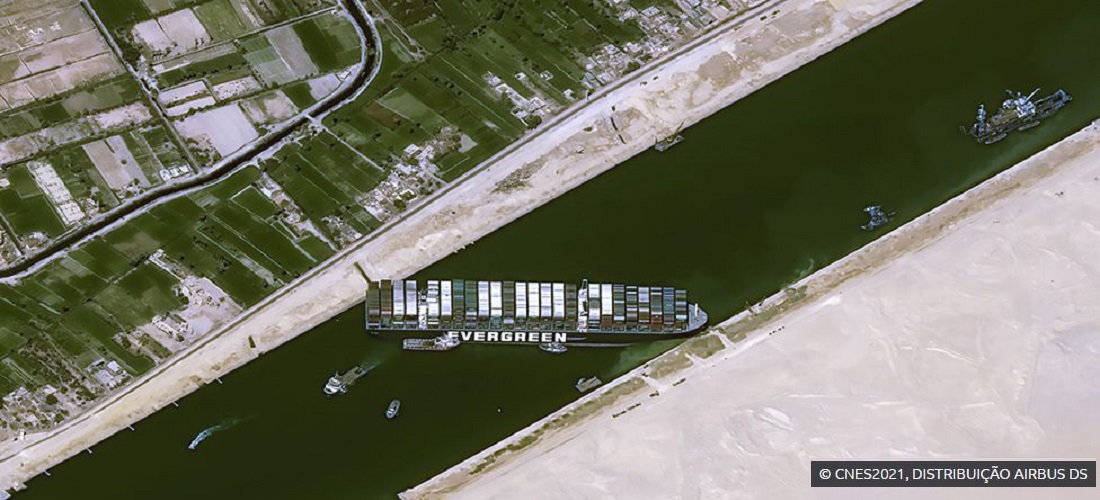
Heavy congestion continues in the Suez Canal
Apr, 04, 2021 Posted by Ruth HollardWeek 202114
A few days after the Ever Given was refloated, after having been grounded since March 23, vessels began moving again through the Suez Canal but progress has been slow. On April 1, about 250 vessels were waiting to pass. Roughly 10% of the world’s maritime trade and 25% of all cargo ships on the planet pass through the Suez Canal.
According to Andrew Lorimer, CEO of Datamar, it should take about a month to resolve the problems generated by the blocked channel. He states that for Brazil, the main route affected is travel to the Middle East and the Far East. As a result, the most affected commodity was Brazilian meat exported to the countries of the Middle East.
To get an idea of the volumes involved, see the graph below for the amount of reefer cargo from Brazil that passed through the Suez Canal in 2020:
Brazilian Imports and Exports via the Suez Canal / Reefer Cargo Volume | Jan to Dec 2020 | TEU
Graph source: DataLiner (To request a DataLiner demo click here)
According to the president of the Suez Canal Authority, Osama Rabie, it is estimated that global daily losses of about US$ 14 -15 million per day have been recorded as a result of the blocked canal.
In turn, data from Lloyd’s List indicates that the stranded ship was holding up about US$ 9.6 billion in trade along the waterway each day. This is equivalent to US$ 400 million and 3.3 million tons of cargo per hour, or US$ 6.7 million per minute.
German insurer Allianz said the blockade could cost global trade between $6 -10 billion a week and reduce annual trade growth by 0.2 to 0.4 percentage points.
Race for insurance
Given these numbers, another problem will be the insurance claims.
According to Lloyd’s List, 90% of marine cargo is not insured in the event of a delay. According to Lucas Leite Marques, a partner at Kincaid Mendes Vianna Advogados, there are different types of insurance, and the parties’ efforts to obtain reimbursement must be extended.
In the shipping market, ships are usually owned by a company and are rented for other users to use. This is the case of the ship that ran aground, which is Japanese but is leased to a Taiwanese company.
Those who rent pay a daily fee for the use of the vessel and, with the delay generated by the obstruction, this amount will increase. In addition, even with the problem in Suez resolved, many of these ships will go to the same ports in Asia, effectively moving much of the congestion to these ports.
Delay insurance could help those who will be harmed in such cases. “Delays can happen in cases of war, port blockages, and obstructions. This type of insurance is less common in this market, and it can leave many affected without compensation”, highlights Marques, who also predicts the start of a race to cut losses. The injured parties will seek out their insurers, who, in turn, will also seek out the cause of the problem to reverse the loss.
From this moment on, an investigation must be conducted by the authority that controls the Suez Canal and by the local maritime authority. But, as the expert warns, it is very probable that new claims will be made in different courts and jurisdictions in the search to find the person responsible and obtain compensation for the losses.
He also points out that, once found, the party responsible for the damage in Suez may also be insured in some way, which will lead them to seek compensation for their own losses. “Due to the relevance of the event, it is not unlikely that an investigation of an international nature will take place so that it will have not only a punitive but pedagogical effect. All of this will have an impact on the insurance market,” he says.
Sources: O Globo, UOL and BBC
-
Ports and Terminals
Sep, 09, 2019
0
Eldorado seeks new terminal in Santos
-
Ports and Terminals
Oct, 11, 2023
0
Port of Paranaguá receives 30 armored vehicles for the Brazilian Army
-
Other Logistics
Mar, 20, 2024
0
VLI appoints new directors for its Northern and Eastern logistics corridors
-
Ports and Terminals
Apr, 15, 2025
0
Brazil’s Port of Imbituba secures environmental license for R$10.4 mln expansion project

